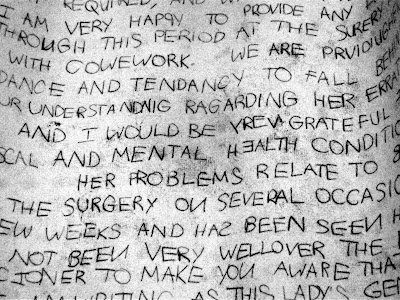Encouraged by my tutor, I took out a Jean Paul Sartre text on Existentialism. My boyfriend, an ex-philosophy student, was dismayed – “you’re going to become one of those people who read one Jean Paul Sartre and think they’re a bloody philosopher.” I underlined parts of the text which felt relevant to the work I was making: “Nothing is absurd if it is part of a rational plan. The ordinary objects of everyday life will no longer seem pointless or dispensable, if one can think of them as necessary means for some genuinely important or necessary end.”

Another tutor encouraged me to think about how an object can be translated to different media (an object to a photograph, or a drawing, or a sculpture) and whether that can transform the value of the object. I was also encouraged to consider scale – if these discarded objects were somehow made bigger than the viewer, would it make the object more important, or worthy of a place?

Only this far into the project did I begin my artist research. I believe that looking closely at another artists work whilst ones own ideas are still emerging can become a hindrance to creativity. Irving Penn’s beautiful photographs of cigarette packets and gum trodden into pavements entertained me – because the objects themselves, which as litter were therefore a cost to society, once photographed by somebody so famous become incredibly valuable. Michael Landy’s ‘Art Bin’ and ‘Scrapheap Services’ interested me too, the latter arguably more political, and the former a piece of modern art that even I cannot completely appreciate. ‘Art Bin’ is a ‘monument to creative failure’ – Landy asked artists to throw, from a large set of stairs, any art work in which they were dissatisfied into the clear bin. His explanation of value within this work interested me – “In the bin there is no hierarchy, so everything is treated the same.” Cornelia Parker’s ‘Thirty Pieces of Silver’ got me thinking about transforming objects through a physical change such as flattening or colouring them.
Having eventually obtained a medical note to account for the slow progress on my FMP, I decided to work the words and idea into my project, since I saw the objects as the physical and non-human equivalents of sick people who had become absent from a place due to some damage. I wondered how I could write letters in the style of the doctor’s note, as if I was a doctor writing to the ground to explain the absence of the object I had taken. The note could also have been from social services (neglect, or a dangerous situation), parents informing of a holiday to be taken, or as myself. If I wrote as myself, the artist, I could explain that the objects had been ‘specially selected’ for its interest to me, and that the selection would help the object rise in status and worth. I made some large monoprints of the letters, as the childlikeness of a monoprint (where the letters are sometimes the wrong way round) contrasted the formality of the original doctors’ letter.

Maybe I had gone a bit off task and forgotten what it was really all about, because I made a series of A4 sized monoprint drawings of the found objects, which isn’t usually what I’m in to. In a discussion with one tutor he asked me “Do you like monoprints?” I probably replied unsatisfactory like “Yeah well you know…” He told me that rather like Tracy Emin doing all her crazy work, then occasionally doing a drawing, it seemed like I had only made these prints in some Emin-like attempt to “prove” that I am a “real artist” because the world isn’t always so accepting of the conceptual kinds of ideas better suited to me. It was a very interesting piece of constructive criticism.
This is what I'm listening to tonight;
I feel like I'm sleeping - can you wake me? You seem to have a broader sensibility. I'm just living on nerves and feelings, with a weak and a lazy mind and coming to peoples parties fumbling deaf dumb and blind. I wish I had more sense of humor - keeping the sadness at bay, throwing the lightness on these things... laughing it all away - Joni Mitchell

No comments:
Post a Comment